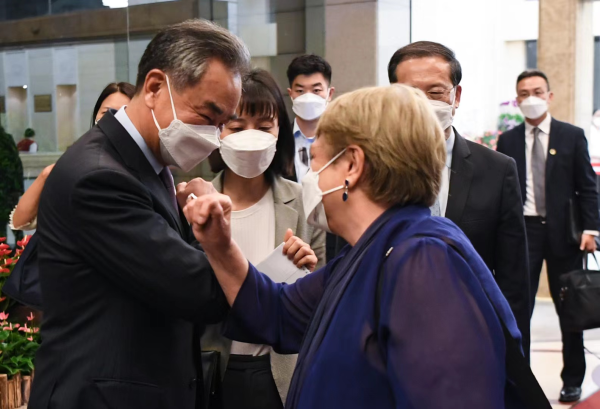UN human rights chief wraps up China visit after wide interactions with all sectors

Chinese State Councilor and FM Wang Yi met with UN human rights chief Michelle Bachelet in Guangzhou on Mon. Photo: Chinese foreign ministry
UN human rights chief Michelle Bachelet has wrapped up her six-day visit in China, including its Xinjiang region, but her statement that showcased her team's wide interactions with people from different sectors in China and progress in facilitating future exchanges between Beijing and Geneva seemed to have disappointed the US. Meanwhile, anti-China forces attempting to use the visit to nail the allegation of "genocide" on China are now trying to deny Bachelet's visit and attacking China for "manipulating" her trip for propaganda.
Such barefaced attacks on both the UN High Commissioner and China clearly show the international community who is trying to manipulate the Office of the UN High Commissioner, analysts said, noting that as the allegation of "genocide" in Xinjiang is absolutely ludicrous and was fabricated for political purposes, neither Bachelet's visit nor visits by anyone else who uphold the truth will bring an end to the US and anti-China forces' hyping of the issue.
On Saturday night, Bachelet held a press conference to issue a statement on her six-day visit in China, during which she noted that for the first time in 17 years, a UN High Commissioner for Human Rights has travelled to China and spoken directly with the most senior government officials and other interlocutors on key human rights issues both in China and globally.
During Bachelet's stay, Chinese President Xi Jinping had a video meeting with herand talked about key human rights issues on May 25, and on May 23, State Councilor and Foreign Minister Wang Yi had a meetingwith Bachelet in Guangzhou, Guangdong Province.
On her trip to China's Xinjiang region, Bachelet said at the press conferencethat they visited Kashi prison and a vocational education and training center which had been dismantled, and spoke to former trainees. They also interacted with civil society organizations, academics and community and religious leaders. While talking with governmental officials, the UN official raised concerns about the application of counter-terrorism and de-radicalization measures.
On Saturday, Chinese Vice Foreign Minister Ma Zhaoxu told media that Bachelet's visit provided an opportunity to observe and experience first-hand the real Xinjiang amid many sensational lies told by certain Western countries and anti-China elements to fulfill their motives of using the Xinjiang region to contain China.
Clouds cannot overshadow the sun, and truth will debunk all lies, Ma stressed, adding that in terms of human rights protection, no one can claim to be perfect and there is always room for improvement. China will unswervingly follow the human rights development path that suits its?national conditions, he added.
US farce
During the press conference, Bachelet reiterated that her trip to China was "not an investigation", and noted that all their meetings with people in the Xinjiang region were "unsupervised" and "organized by us."
Bachelet's visit to the Xinjiang region is only part of the High Commissioner's efforts to speak to a wide range of people, from senior officials to ordinary citizens, to learn more about China and to facilitate future interactions between Beijing and Geneva, Wang Jiang, a distinguished research fellow at the Institute for Frontier Regions of China, Zhejiang Normal University, told the Global Times.
However, the US has ignored the meaning of the trip and only focused on topics on Xinjiang, expressing opposition after seeing that Bachelet's statement did not align with its "genocide" allegation. "Now we can see who is trying to manipulate the High Commissioner," said Wang Jiang.
Hours after Bachelet released her statement on her visit in China and its Xinjiang region and shared the experience of having "unsupervised" and open discussions with a wide range of people in the region on Saturday, US Secretary of State Antony Blinken released a statement to express "concerns" on China's "efforts to restrict and manipulate" Bachelet's visit and also claimed that "genocide" is ongoing in the region.
Analysts called Blinken's remarks textbook practice after failing to pressure the UN human rights chief to act like a US puppet and support its "genocide" allegation against the Xinjiang region, pointing out that repeating lies made by US-backed anti-China forces will not make them more real, but only expose its malicious use of human rights topics to attack China.
They noted that Blinken's "concerns" listed in the statement have been exposed as lies and disinformation and have been debunked by scholars, media and the Chinese government. For example, the allegation of more than one million people "detained"in the Xinjiang region mentioned by Blinken had been found to be fabricated on the basis of interviews with eight Uygurs and was spread widely by rumor monger Adrian Zenz and Western media.
Jeffrey Sachs, a professor of economics at Columbia University in New York and also a senior UN advisor, wrote in an email to the Global Timesthat Bachelet's UN mission "should not be attacked or criticized by the United States government even before the trip takes place!"
He said that issues related to the Universal Declaration of Human Rights should be addressed through UN processes and "not used to raise geopolitical tensions."
Blinken's statement is just the latest farce that the US and some anti-China forces have created recently. Before and during Bachelet's visit in China, they expressed opposition to her visit - a U-turn from previous vehement calls for a visit to the region and claims that the human rights chief's "credibility" is at stake as she would be "fooled" by China into being used as a "propaganda tool." Some also urged the Office of the High Commissioner to release its report on "violations of human rights" in China's Xinjiang region.
Since last year, anti-China forces, especially the US-backed World Uyghur Congress, have rallied dozens of organizations to pressure the Office of the High Commissioner to have "genocide" investigated on a list provided by the "Uyghur Tribunal" - another farce staged by the WUC, which analysts slammed for having strong political objectives.
The Office of the High Commissioner has its own independent mechanism. On the premise of respecting China's sovereignty, there are some questions related to China's Xinjiang with specialized rapporteurs and experts working in a coordination team to assess China's ethnic and religious policies, and measures on counterterrorism and de-radicalization, Zhu Ying, a professor from the Baize Institute at Southwest University of Political Science and Law, told the Global Times.
Nothing like "genocide" has been found in Xinjiang by the rapporteurs. Western countries and the US may have seen the report, which is why they have made such attacks against China, attempting to nail the allegation of "genocide" on China by either hyping so-called missing individuals or "forced labor," said Zhu.
But the Western media cannot represent international public opinion nor can it manipulate the High Commissioner, said Zhu, noting that Bachelet held the online press conference to dismiss rampant disinformation and also reiterated the stance and functions of the High Commissioner.
"You can't find something that does not exist! There is no genocide in China's Xinjiang and anyone pressuring Bachelet to 'dig dirty' in the region is actually using the High Commissioner as a political tool," Chang Jian, director of the Research Center for Human Rights at the Tianjin-based Nankai University, told the Global Times.
Chang noted that Bachelet raised her concerns on finding a balance between counterterrorism and protecting human rights, and China also outlined to her China's measures in this field and the reasons behind them.
"As the international community explores better ways in this field, China is always listening to voices from others. Ms Bachelet is offering advice as the High Commissioner, which is a good opportunity to have better communication and promote human rights protection, but the US will never admit it," said Chang.
In the Saturday statement, Bachelet mentioned the "tremendous achievements of China" on poverty alleviation and eradication of extreme poverty and also its efforts in support of the multilateral 2030 Agenda and the Sustainable Development Goals, both at home and internationally.
The High Commissioner also noted that her office and China agreed to establish regular engagement and to have a working group to facilitate substantive exchanges and cooperation.
Analysts noted that Bachelet's visit is a good start for China and the High Commissioner to have more candid communication and for UN officials to gain a better understanding of the Xinjiang region. However, this is what the US and anti-China forces do not want to see and they may smear China harder after Bachelet's visit.
While the US was paying close attention to Bachelet's visit in China's Xinjiang, a gun shooting tragedy that took place at a primary school in the US, killing at least 19 children, exposed the severe racism and human rights violations of the US.
Bachelet said at the press conferencethat the killing in Texas was very sad. It shows that the problem has not been resolved and everybody should continue struggling against racial discrimination."
Wang Jiang noted that it is also ironic and ridiculous to see Blinken's "concerns" over people living in China's Xinjiang, a region far from the US, but taking no time to care for the severe human rights violations in the US or to even protect American children.
"When it cannot ensure the safety of children, how can the US call itself a civilized country and point fingers at other countries' human rights?" asked he.
Photos
Related Stories
- Chinese envoy calls for commitment to political settlement for Libya crisis
- Chinese envoy criticizes U.S. for failure as penholder on issue of South Sudan sanctions
- Chinese envoy calls for well-tailored approach to Israeli-Palestinian issue
- Chinese envoy warns against double standards on protection of civilians in armed conflict
- Chinese envoy calls on int'l community to provide constructive help to Sudan
- Chinese envoy urges countries to increase coordination, stabilize global food market
- China welcomes upcoming visit of UN human rights chief
- Group of Friends of Global Development Initiative holds high-level meeting
- Global Security Initiative offers solution to eliminating peace deficit: Chinese vice FM
- Respect small states, practice true multilateralism: Chinese envoy
Copyright © 2022 People's Daily Online. All Rights Reserved.










